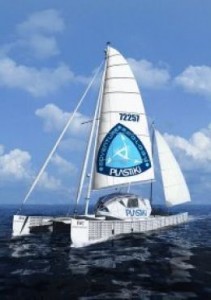
Plastiki - David de Rothschild's yacht made of recycled PET bottles
As we have discussed in previous posts, there is a huge and ever-increasing mountain of rubbish growing in the middle of the Pacific, like a giant festering ’soup’, much of which consists of plastic packaging waste. This has had a massive knock-on affect in the form of polluted beaches on islands throughout the South Pacific. See our previous article: Great Pacific Garbage Patch article
David de Rothschild is a man on a mission. The offspring of the wealthy banking family, he is one of a new breed of environmental crusaders and entrepreneurs that some are calling ‘Gaia capitalists’. ‘Gaia’ in mythology was the primal Greek goddess of the Earth and aptly a ‘gyre’ in oceanography is any large system of rotating ocean currents (source: Wikipedia).
To highlight the Pacific issue and raise it’s profile in mainstream media, De Rothschild decided to use his family’s high profile (& money) to build a yacht made entirely of recycled plastic bottle packaging, which he named ‘Plastiki’ (making reference and tribute to the late Thor Heyerdahl’s papyrus Kon-tiki raft which crossed the Pacific back in 1947). Over a four month period he sailed this 60ft catamaran from San Francisco to Sydney, where he landed last week. But his exploits are no shallow ploy to fill aimless days with fun and adventure.
De Rothschild and his ‘Gaia’ friends are driven by a combination of social conscience and economic pragmatism, seeking a ‘paradigm shift’ in the way we live and desecrate our planet. They espouse a new form of capitalism that factors in the environment and social wellbeing as a cost. It considers protecting the environment not only as a moral issue but as a set of design challenges to correct inefficiencies that make the capitalist system unsustainable. Waste, for example, is considered the result of inadequate thinking. If you are smarter about it, and create products that work properly, then you shouldn’t have to throw anything away at the end – should you? The group include Chad Hurley (33) who with his co-founder, sold YouTube to Google for $1.6Bn and has since ploughed some of his fortune into the Green Products Innovation Institute and Jeffrey Skoll, worth $2.4Bn, who wrote the business plan for eBay and has set up the Skoll Foundation to encourage ’social entrepreneurs’ to play a greater role in developing a better world (source: The Sunday Times).
These are ‘game changers’, who see solutions where others see problems – a new entrepreneurial revolution – one of collaboration something that de Rothschild calls ‘Planet 2.0′. So I feel that we will be hearing a lot more from this ‘band of brothers’ in the future. They mean to ‘rattle some cages’, get us all to think differently and make a real impact by influencing things at ‘the top’. They have a point! Can we really carry on the way we are? For a really ’sustainable future’, for our children and their children’s sakes, things have to change a lot quicker.What do you think?
Chris Penfold

